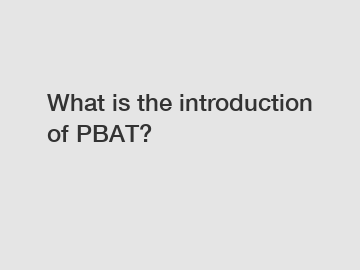What is the introduction of PBAT?
Originating from research and development efforts in the field of polymer science, PBAT was first synthesized in the late 1980s. This biodegradable polymer is a copolymer consisting of adipic acid, terephthalic acid, and butanediol. It exhibits favorable physical and mechanical properties, making it a promising alternative to conventional plastics in a wide range of applications.
The validation of PBAT as an environmentally-friendly material has been substantiated through extensive scientific research. Numerous studies have shown that PBAT has excellent biodegradability under both aerobic and anaerobic conditions, meaning it can break down into natural components when exposed to microorganisms in soil, water, and industrial composting facilities. This trait significantly reduces the accumulation of plastic waste in landfills and contributes to a cleaner environment.
Furthermore, PBAT's favorable characteristics make it a versatile material with far-reaching implications. When used as a packaging material, PBAT can extend the shelf life of food products due to its excellent barrier properties against moisture and oxygen. In the agricultural sector, PBAT-based mulch films have been developed to replace traditional non-biodegradable films, reducing the environmental impact caused by plastic waste in farming. Additionally, PBAT can be used in the production of disposable utensils, bags, and other single-use items, providing a sustainable solution for the ever-increasing plastic pollution problem.

The rise of PBAT in various industries not only benefits the environment but also presents lucrative opportunities for businesses. With the growing consumer demand for eco-friendly products, companies that embrace PBAT as a raw material can position themselves as sustainable and socially responsible. This not only enhances their brand image but also opens doors to a broader market segment that actively seeks out environmentally friendly alternatives.
In conclusion, PBAT, or Polybutylene adipate terephthalate, is a biodegradable polyester that has emerged as a viable solution to address the problem of plastic waste. Its origins lie in polymer science research, and its biodegradability has been validated through scientific studies. PBAT's favorable properties and versatile applications make it an attractive choice for industries aiming to reduce their environmental impact. By embracing PBAT, businesses can align themselves with sustainability goals and tap into a growing market segment focused on eco-friendly alternatives.
For more biodegradable plastic sleeves, resin biodegradable, compostable plastic bags manufacturerinformation, please contact us. We will provide professional answers.
204
0
0

Comments
All Comments (0)